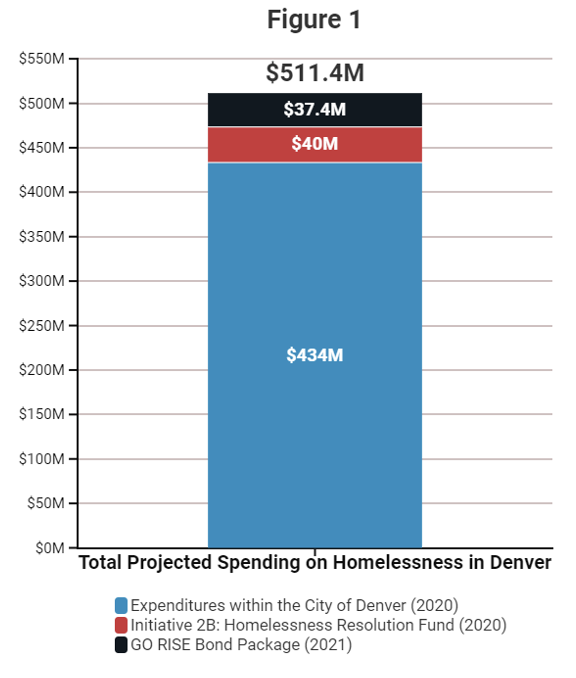This November, Denver voters face two ballot measures related to homelessness:
- Initiated Ordinance 303: “Let’s Do Better”
- Referred Question 2B: Denver Housing and Sheltering System Bonds as part of the RISE GO Bond
At the start of the pandemic, there were an estimated 6,104 individuals, both sheltered and unsheltered, experiencing homelessness, a 25% increase over three years.
[i] Since then, the Metro Denver region’s sheltered population
increased by 40%.
[ii] According to Common Sense Institute’s (CSI) “
The Economic Footprint of Homelessness in Metro Denver”, at least $481.2 million was spent annually as of 2019 on shelters, services, emergency response and healthcare for individuals experiencing homelessness within the Denver Metro region.
Of the total estimate, approximately $434 million was spent within the City of Denver.
Neither of the proposed 2021 Denver ballot measures require new revenue streams, yet both direct and demand additional expenditures.

If passed, the recurring expenditures on homelessness in the City of Denver would total more than $511.4 million.
Initiated Ordinance 303: Let’s Do Better
The “Let’s Do Better” Initiative proposes the City and County of Denver continue to enforce unauthorized camping, with the exception of four newly established camping locations on public property. This initiative is not intended to replace other programs serving the unhoused community.
If Enacted:
- It will be unlawful for any person to camp on public property, except in up to four designated locations where camping has been expressly allowed.
- The authorized encampments must provide running water, restroom facilities, and safety lighting for those residing there.
- Any person can file a complaint with the city to enforce this measure and the city must take enforcement action within 72 hours of the filing.
- If action is not taken within 72 hours of the complaint, private citizens reserve the right to take legal action against the city.
“Let’s Do Better” Interaction with 2020 Initiative 2B
Denver voters passed
Initiative 2B: Homelessness Resolution Fund in 2020, which increased the city sales tax by .25% to raise an estimated $40 million annually for homeless related priorities. Initiative 2B funding creates more resources for those who are unhoused through combining housing and services, restoring lost shelter capacity, and improving health and services.
- According to the Denver Department of Housing Stability’s Five-Year Strategic Plan[iii], future spending priorities include:
- Create and preserve 7,000 homes
- Preserve 950 income-restricted rentals
- Measurably end veteran homelessness
- Reduce unsheltered homelessness by 50%
- Increase the number of people who exit shelter into housing from 30% to 40%, and families from 25% to 50%
- Reduce the average length of time residents experience homelessness to 90 days
- They have not yet finalized any official plans for specific programs or services.
- Proponents of Ordinance 303 argue that funds from 2020 Initiative 2B could be used to cover new costs arising from expenses related to designated camping areas.
2021 Referred Question 2B: Denver Housing and Sheltering System Bonds
Denver Mayor Michael Hancock’s administration proposed a $450 million General Obligation (GO) bond package that includes 80 distinct projects across the City of Denver. The annual premium to fund the bond is expected to be paid for with revenue from existing property taxes.
Included in this package is
$37.4 million to secure and improve facilities that serve people experiencing homelessness.
[iv] The City and County of Denver estimates the full economic impacts of GO RISE projects to generate an estimated 7,500 jobs, $483 million in worker wages and benefits, and $1 billion in total economic benefits.
[i] CoC Homeless Population and Subpopulation Reports – HUD Exchange
[ii] PIT+2021+Metro+Denver+Regional+Report.pdf (squarespace.com)
[iii] https://www.denvergov.org/files/assets/public/housing-stability/documents/pdf_080221_forpubliccomment_english.pdf
[iv] City of Denver, “City Releases $450 Million General Obligation Bond Package Details”, July 27, 2021.